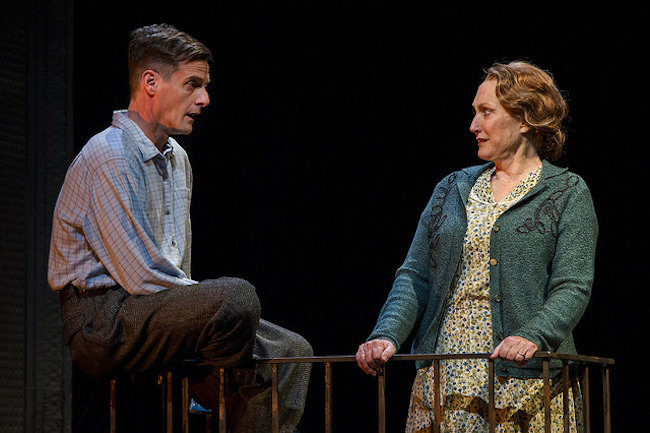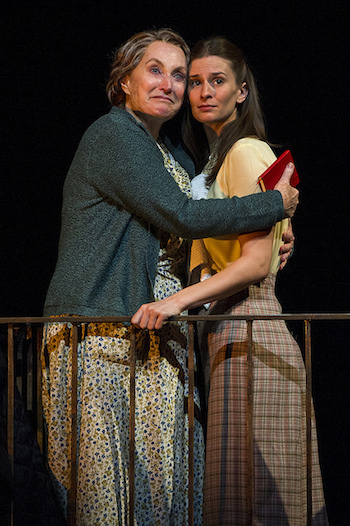Theater Review: “The Glass Menagerie” — Doing Justice to an American Classic
This is a first-rate production of a true American classic.
The Glass Menagerie by Tennessee Williams. Directed by Julianne Boyd. On the Barrington Stage Company’s Main Stage, 30 Union Street, Pittsfield, MA, through October 21.

Mark H. Dold and Caitlin O’Connell in the Barrington Stage production of “The Glass Menagerie.” Photo: Daniel Rader.
By Helen Epstein
Julianne Boyd, founder and longtime artistic director of Barrington Stage in Pittsfield, has produced an ambitious season this summer, beginning with Mark St. Germain’s intriguing Typhoid Mary and culminating with an exhilarating revival of the classic musical West Side Story. Now Boyd has extended her winning streak into the fall with a brilliant production of The Glass Menagerie. I saw the American Repertory Theater’s much ballyhooed production starring Cherry Jones in 2013 and quickly forgot it. I won’t forget this more modest and crystalline ensemble piece for a long time.
Tennessee Williams’ deeply American “memory play” about a broken family – mother, daughter and son abandoned by a “a telephone man who fell in love with long distance” in the ’30s – opened to acclaim in New York in March of 1945. It was the playwright’s first big success and I’m among those who find it as beautifully-written and affecting today.
Boyd is a traditional director whose work consistently respects the playwright and script rather than highlighting her own spin on it. She casts actors who can speak the music in the lines and also coalesce as a group. There is no star in this Glass Menagerie — no villain or hero. Its strength rests on a balanced quartet of actors who portray rounded characters caught in a difficult situation. A violist provides the background music Williams called for. The design team is similarly cohesive. The original music by Alexander Sovronsky, a pleasing platform set design by Brian Prather, period costumes by Elivia Bovenzi, lighting by Matthew Richards, and sound design by Joel Abbott blend into a satisfying whole.

Angela Janas and Catlin O’Connell in the Barrington Stage production of “The Glass Menagerie.” Photo: Daniel Rader.
Mark H. Dold is a tall, gaunt, and often grim Narrator, guiltily recalling his escape from St. Louis while doubling as his younger self, the passionate 24-year-old, aspiring writer Tom Wingfield, whose shoe warehouse buddies nickname Shakespeare. He has you in his pocket from the moment he speaks the lines, “I take you back to an alley in St. Louis. The time that quaint period when the huge middle class of America was matriculating from a school for the blind. Their eyes had failed them, or they had failed their eyes, and so they were having their fingers pressed forcibly down on the fiery Braille alphabet of a dissolving economy. In Spain there was revolution—Here there was only shouting and confusion and labor disturbances, sometimes violent, in otherwise peaceful cities such as Cleveland—Chicago—Detroit. . .”
His Tom is desperately ambivalent, torn between his own literary ambition and desire to get out of town in the way his father did, but guilty about the two women he will leave behind. The character’s humor is quick and sardonic, and Dold lets us experience every shade of his complicated relationship with his desperate, dominating mother Amanda and fragile sister Laura.
Angela Janas plays Tom’s physically and psychologically frail older sister. Slender, with a wonderfully expressive face, Janas, too, presents a multifaceted character who tries to hold her ground with two stronger family members. Although Laura lives in a constricted world of little glass animals and old phonograph music, Janas and Boyd succeed in our seeing aspects of ourselves and others we know in her performance.
The traditional star turn in The Glass Menagerie is Amanda Wingfield, the domineering would-be southern belle of Blue Mountain, who runs her household with an iron hand, confiscates Tom’s books, and orders her daughter to perform feats that Laura simply cannot. Catlin O’Connell does a good job of making us see that Amanda is not a monster, but a mother caught between maternal love and maternal fear, as well as fear for herself as a dependent woman. In one of the most affecting scenes of the play, as she is trying to sell magazine subscriptions over the telephone to supplement the household income, O’Connell lets us see her surprise, relief, and sense of solace when Amanda, so often portrayed as the DAR battleax she also can be, shows us her vulnerability.
This is a first-rate production of a true American classic.
Helen Epstein is the author of Joe Papp: An American Life and nine other books of non-fiction, available at plunkettlakepress.com. She has been reviewing for Arts Fuse since 2010.
Tagged: Barrington Stage Company, Culture Vulture, Julianne Boyd

